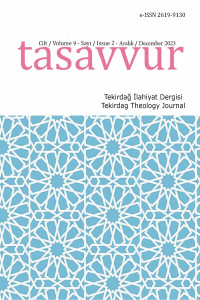Zâhirî Âlimlerin Ashâbu’l-Hadis/Ehl-i Hadis Algısı
Perception of Ashab al-Hadith/Ahl al-Hadith of Zahiri Scholars
Author(s): Hüsamettin KayaSubject(s): Education, Islam studies, Religion and science , Sociology of Education, Qur’anic studies
Published by: Tekirdağ Namık Kemal Üniversitesi İlahiyat Fakültesi
Keywords: Ḥadīth; Ashâb al-hadīth; Ahl al-hadīth; Ẓāhirī Sect Criticism;
Summary/Abstract: Concepts such as ashâb al- hadīth and ahl al-hadīth, which have began to be used since the period of the Companions, refer to people who are busy with teaching and learning hadīth and who have the science of rijal and who have authority to speak on all matters related with hadīth topics. The most distinctive feature of these people is that they have tried to understand the hadīth texts according to their opinions as much as possible, without applying them to any comparisons. Besides Shafi'is and Malikis, known for their closeness to their opinions, Ẓāhirīs who have advocated being loyal to the words of hadīths, also have ranked as ashâb al-hadīth. Ahl al-hadīth who have made themselves accepted by the Islamic community, went through a mihna process in the first half of hegira III century. However, the mihna that they experienced at the end of the process have made ahl al-hadīth stronger in the eye of public. Ahl al-hadīth, who have played important role in the development of Islamic sciences, have attracted the attention of the researchers. Within this context, it is important to examine the attitudes towards ahl al- hadīth in the Islamic tradition of thought and to determine their consistency. Therefore, in this study, ashâb hadīth perception of Ẓāhirī scholars, accepted as ashâb alhadīth, will be discussed. In this study, it was aimed to find out to what extent Ẓāhirī scholars embrace value of ashâb al-hadīth as well as how much they make a claim to the opinions they have put forward in the tradition of Islamic thought. In addition to this, among the aims of our study, we tried to determine whether the Ẓāhirī scholars approach the issues objectively or not. So, the works of Ẓāhirī scholars were investigated with an inductive method, and the information obtained were assessed. As a result of this, that ashâb alhadīth have been praised in Qur’an verses was adopted by Ẓāhirī scholars, and it was determined that for Zâhirî scholars, to be a member of ashâb al-hadīth was a sign of proud. Although the Ẓāhirī scholars' view of ashâb alhadīth led them to use the concept of ashâb al-hadīth as an expression of modification, this has not become a generally valid rule. Because it has been seen that many narrators were rejected for different reasons, even though they were from ashâb al-hadīth. In addition, it has been determined that Ẓāhirī scholars frequently use the concept of ashâbü’l-hadīth as a qualifying adjective in the science of rijal. Although they attached great value to ashâb alhadīth, it was also observed that they criticized them for making mistakes because of their views on the permissibility of acting on weak hadīths, and the fact that a narrator narrates a hadīth by both his teacher and his teacher's teacher makes the hadīth weak.
Journal: Tasavvur Tekirdağ İlahiyat Dergisi
- Issue Year: 9/2023
- Issue No: 2
- Page Range: 1465-1494
- Page Count: 30
- Language: Turkish

